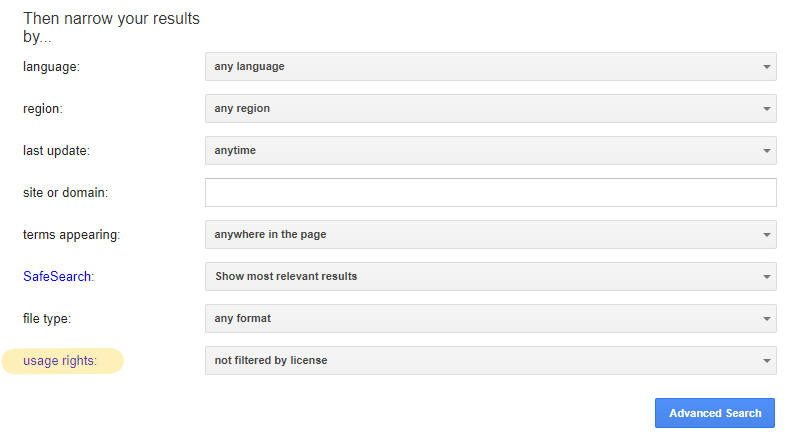Finding Open Content
Learning Objectives
By the end of this section, you will be able to:
- Demonstrate how to conduct a preliminary search for open educational resources.
- Use advanced searching strategies to locate relevant OER.
- Find support for locating OER at SAIT.
Search Tips
Start Broad
The previous section reviewed available repositories, search tools, and resources to help you find the right OER for you. But how can you use all of these sites effectively? For the most results, start with a broad search focused on your discipline. Once you’ve brought together a large collection of resources, then you can begin to evaluate and refine your results list.
One way to effectively refine your results is to identify the significant keywords for your concepts. You can use this worksheet to generate keywords from your course outcomes:
 Scenario – Locating a Textbook
Scenario – Locating a TextbookRemember Dr. Fermin? She teaches a course on abnormal psychology and wants to find videos, readings, and case studies related to this topic for her course. Here is an example of a search strategy she can follow by starting broad:
- Search the Open Textbook Library or other textbook repositories for “Psychology.” Peruse the Tables of Contents of listed textbooks to find chapters or sections focusing on topics covered in the course.
- Search OASIS or other Federated Search Tool for “abnormal psychology.” Since OASIS searches content on multiple repositories, limiting your search a little more can be useful. These can then be sorted by format, type, or date.
- Search YouTube for videos on specific topics related to Abnormal Psych. Since YouTube contains so many different types of content, being specific is more important on this platform.
- As a last-ditch effort, do an Advanced Search in Google for “Abnormal Psychology” (we will discuss this more below).
By the end of these searches, Dr. Fermin has compiled the following list: Abnormal Psychology OER List [Google Docs]
Check Your Understanding
- Try out your own search in a textbook repository or federated search tool using the simple keywords you identified in the earlier exercise. What did you find from your initial search? Did you have to broaden or narrow your search terms to find suitable results? Upon initial review, do you see any relevant resources in your results list?
Filter by Usage Rights in Google
Google is a familiar resource for many of us, and it is also useful for finding openly licensed content. The Advanced Search feature in Google allows you to filter results by Usage rights. Filtering by usage rights will limit your results to works with certain licenses listed on the webpage, usually Creative Commons licenses. There are a few options to choose from in the Usage Rights list, but we recommend starting with “free to use or share” to retrieve the broadest set of results. Adding “OER” to your search terms can help you locate materials created for sharing if your Google search is retrieving too many results.

Remember when using this method that Google trusts what users tell it about an item’s copyright status. Although a resource may be labeled CC BY or even CC 0, you should trust your instincts if you aren’t sure whether the item you are reviewing is actually under copyright. Contact SAIT’s Copyright Officer or OER Librarian if you have questions.
Check Your Understanding
- Search Google using your keywords and the Usage Rights filter discussed above. What did you find from your initial search? Click through two or three of the results. Does the copyright status reported by Google match the information found within the resource or website?
- Search YouTube using your keywords and filter the results for the Creative Commons feature. What did you find from your initial search? How did the results change when you applied the CC filter?
Keep an Open Mind
You don’t have to jump into a fully open course right away. Start small by adding OER lesson plans to your coursework, or wait and see what OER are published next semester. The number and breadth of OER available are changing every day. Although there might not be resources available for your course right now, that may not be the case next year or even next month. Including OER in your regular assessment of materials for use in your course is a great first step for finding resources you can adopt in the future.
Getting Help
Reg Erhardt Library staff can also help you identify suitable OER textbooks for your courses – contact your Library Liaison for more information about this process. If you have specific questions about search techniques for open licensed materials, contact the OER Librarian.
In the next section, we’ll look at how to evaluate the resources that you’ve located for their quality and fit to your course. Don’t forget that OER can also be adapted to fit your course; information about that process will be discussed in future chapters.

